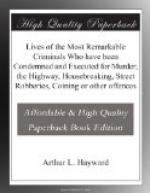Common report has swelled the number of malefactors executed through his means to no less than one hundred and twenty; certain it is that they were very numerous in reality as in his own reckoning. The most remarkable of them were these: White, Thurland, and Dunn, executed for the murder of Mrs. Knap, and robbing Thomas Mickletwait, Esq.; James Lincoln and Robert Wilkinson, for robbing and murdering Peter Martin, the Chelsea Pensioner (but it must be noted that they denied the murder even with their last breath); James Shaw, convicted by Jonathan, for the murder of Mr. Pots, though he had been apprehended by others; Humphrey Angier, who died for robbing Mr. Lewin, the City Marshal; John Levee and Matthew Flood, for robbing the Honourable Mr. Young and Colonel Cope, of a watch and other things of value; Richard Oakey, for robbing of Mr. Betts, in Fig Lane; John Shepherd and Joseph Blake, for breaking the house of Mr. Kneebone; with many others, some of which, such as John Malony and Val Carrick, were of an older date.
It has been said that there was a considerable sum of money due to him for his share in the apprehension of several felonies at the very time of his death, which happened, as I have told you, at Tyburn, on Monday, the 24th day of May, 1725; he being then about forty-two years of age.
[Illustration: JONATHAN WILD PELTED BY THE MOB ON HIS WAY TO TYBURN
(From the Newgate Calendar)]
FOOTNOTES:
[61] A few additional particulars
concerning Wild may be of
interest.
Soon after he came to London he opened a brothel in
the
infamous Lewkenor’s Lane, in partnership with
Mary Milliner;
after
a time they quitted it to take an alehouse in Cock
Alley,
Cripplegate.
He then drifted into business as a receiver and
instigator
of thefts, organizing regular gangs which operated
in
every
branch of the thieving trade. On account of the
number of
criminals
he brought to justice (as a result of their disloyalty
to
himself) the authorities winked at and tolerated his
proceedings;
and in January, 1724, he had the impudence to
petition
for the freedom of the City, as some recognition for
the
good services he had rendered in this direction.
A few
months
later, however, his reputation became sadly blown upon,
and
in January, 1725, he was implicated in an affair with
one of
his
minions, a sailor named Johnson, who had been arrested
and
had
appealed to Wild for help. A riot was engineered,
in which
Johnson
made his escape, but information was laid against the
thief-taker,
himself, who, after lying in hiding for three
weeks,
was arrested and committed to Newgate, which he only
left
to
attend his trial and to take his last ride to Tyburn.




